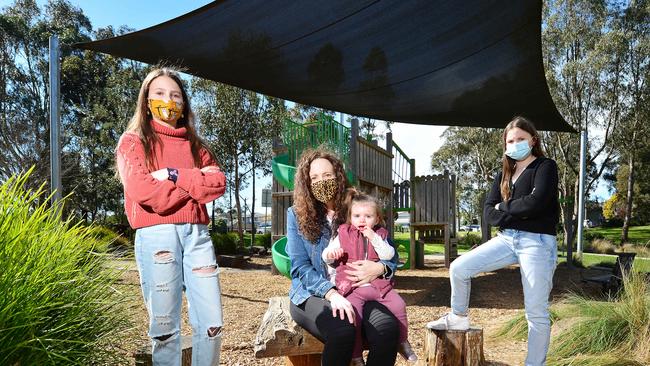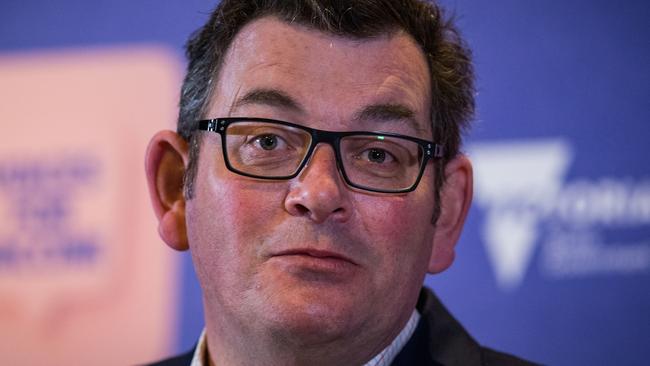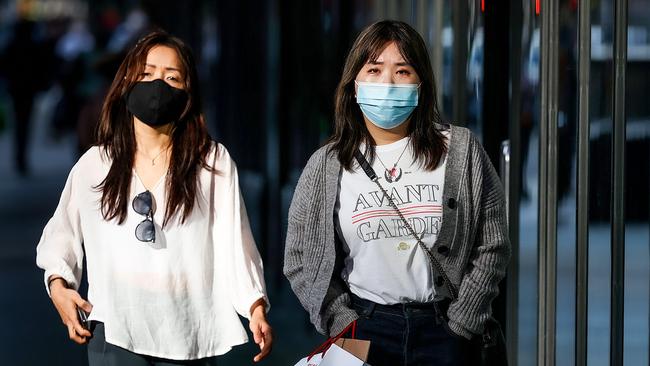Playground ban scrapped as some Victorian Covid restrictions set to ease
The controversial playground ban will be axed this week, while the curfew and 5km travel limit could be lifted under a plan to stagger the lifting of lockdown restrictions.
Coronavirus
Don't miss out on the headlines from Coronavirus. Followed categories will be added to My News.
The controversial playground ban will end from Friday, as part of a long-awaited road map out of lockdown, as Victoria’s zero-case goal fades.
Premier Daniel Andrews, ministers and health chiefs were on Tuesday night also discussing whether to lift the curfew and increase the 5km travel limit, under a gradual easing of restrictions.
It is understood that lighter restrictions in regional areas — except in places where there is an outbreak, such as Shepparton — were also considered.
The possibility of introducing household bubbles, similar to the singles bubble but instead covering families, was also floated.
Other than the reopening of playgrounds, the timing of other restrictions being eased is not known.
Specific targets were being discussed to trigger the staggered relaxation of rules in coming weeks.

It comes amid concern late on Tuesday night about a spike in the number of cases that have emerged over the course of the day.
In Monday’s Herald Sun businesses called for a hopeful and realistic road map out of harsh restrictions, and an exclusive poll in Tuesday’s paper revealed Victorians feared the mental-health toll and job losses caused by lockdowns more than a surge in Covid-19 cases and deaths.
The “detailed plan”, to be released on Wednesday, will specify the number of infections health authorities could “tolerate” in the community with eased restrictions.
It marks a significant change in Victoria’s Covid strategy, with Premier Daniel Andrews conceding on Thursday that a “middle path” between zero cases and hard lockdowns was possible, until the state reaches the 80 per cent vaccinated target.
“I am confident we can find that middle path where we have not necessarily zero but low numbers,” he said.
“Is there a sweet spot, is there that case number that’s not zero but it’s not so high that it inevitably becomes 500, 1000, 1500, 5000 (cases) … If we can’t achieve zero, despite our best efforts, how many cases can we tolerate?”

Although acknowledging that “some of these rules can’t be on forever”, Mr Andrews tempered expectations, saying only a “modest easing of restrictions” would be announced on Wednesday.
“I do want to be very clear with the people of Victoria – this will not be Freedom Day, it will not be an opening-up type day. It’ll be modest changes that hopefully can be meaningful in people’s lives,” he said.
“We’re looking at all manner of different things that we might be able to do.”
The road map out of last year’s second lockdown set Victoria’s target at a 14-day rolling average of five cases, with fewer than five mystery cases.
The state’s seven-day rolling average is currently 72.7, with 76 new local cases – including 31 mystery infections – recorded on Tuesday.
The new plan comes as more major events tumble, including the AFL grand final and Brownlow Medal, which authorities officially announced would be moved to Perth. The Melbourne Food and Wine Festival has also been cancelled.
The Herald Sun understands it is highly unlikely household visits will be allowed for Father’s Day on Sunday, although it is not known if small outdoor gatherings could be approved.

Save Victorian Events spokesman Simon Thewlis said the grand final’s relocation represented a loss of a whole month of events.
“For us, it is not the loss of a football game that happens on one day … It is the loss of weeks of back-to-back football related events,” he said.
“The finals season also marks the end of the long, quiet winter for the event industry – and with Covid it has been deathly quiet.”
It comes as Victorian events leaders brace for a worsening crisis after 26 per cent of businesses told an industry survey they are unlikely to survive the year. A further 47 per cent said they were unsure of survival, in the survey conducted by Save Victorian Events, which represents 930 events businesses.
The Premier has ruled out a return for schools on Thursday.
“It’s not like a tick and flick sort of thing. Everything is considered, and if the answer is no, it’s for very good reason,” he said. “(There’s) not going to be wholesale changes.”
The state is projected to hit the national thresholds for reopening – 70 per cent and 80 per cent fully vaccinated – on November 1 and 18 respectively. Victoria is behind NSW, Tasmania and the ACT, according to the Covid Live projections, but ahead of Queensland, WA and the Northern Territory.
Despite repeatedly saying local lockdowns failed to control Covid hot spots last year, Mr Andrews on Thursday said he would follow the health advice if that is what it recommended.
“My view is the evidence tells us, from last year, they did not work,” he said.
“(But) if, for one reason or another, people came to a different view and circumstances changed … I follow it.”
Opposition Leader Michael O’Brien said Mr Andrews didn’t have a plan to get Victoria out of its sixth lockdown.
“He just has a plan for more pain, and more of the same,” he said.
Industry leaders have welcomed the state government’s promise of a new plan, but said it must provide adequate support to struggling businesses.
Victorian Chamber of Commerce and Industry chief executive Paul Guerra said businesses wanted a plan to get them “back and firing”.
“Delta has put in a new variant in that it’s almost impossible from what we can see to get to zero cases,” he said.
“We can’t stay closed until we get to 70 per cent. It is about what is manageable.”
Victorian Tourism Industry Council chief executive Felicia Mariani called for a four-point survival plan to save the state’s visitor economy.
“We’ve got to hang on for another eight to 10 weeks but we’re on our knees right now,” Ms Mariani said.
Small Business Australia executive director Bill Lang said the current “wait and see” approach had become close to unbearable for businesses hanging on by a thread.
“What these owners of these family-run businesses want to hear is the plan that gets us out of this mess, into a world where we live with Covid and lockdowns and business closures are in the past – not the present and the foreseeable future.”




